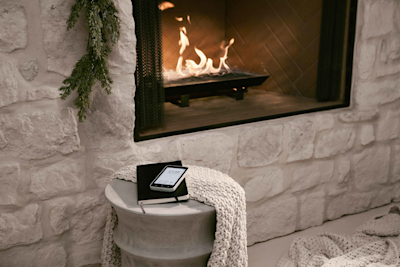
Log off: Be happy in the here and now
What would happen if you stopped following your friends on social media every day or scrolling through feeds of strangers? Perhaps you could read a book or walk your dog. What would happen if you didn’t post updates on your own profile? Could you be comfortable, just being in the here and now?
Most of our time is spent doing mundane things. We go to work, come back home, maybe meet a friend for coffee and do some grocery shopping. Our life is filled with normal, everyday activities. At the same time, we are also spending more and more time online, scrolling through Instagram and Facebook, sometimes falling down the TikTok and Snapchat rabbit hole. And there, we often find a different, more fascinating world. In the world of social media, it turns out that almost everyone leads an interesting life, completely different from ours. Consequently, we are more inclined to compare ourselves with others. We might feel that everyone’s life is more appealing than our own. We look at the pictures, read the descriptions and something inside us starts to upset us. The individuals in the pictures seem more attractive and accomplished than us. As a result, frustration, combined with sadness, can set in.
FOMO & the constant state of stress
It's very difficult to disengage from social media. Those apps are intentionally designed to keep us constantly engaged, leading to a phenomenon called FOMO, when we eventually do log off. FOMO stands for FEAR OF MISSING OUT, which means that when we’re not scrolling through social media, we feel a strange anxiety. We feel like we're missing out on something important.
During the last two years of the global pandemic, when most activity moved online, this habit has become even stronger. We feel a relentless urge to reach for our mobile device just to see what’s going on with our friends. However, it turns out that compulsive use of social media does not actually improve our sense of well-being. On social media, almost everyone shows off a better version of themselves and their lives. Constantly looking at those images has shown to cause anxiety in people viewing this content. This anxiety is the result of several feelings. One of those feelings is exclusion (you're not there, where the cool kids are), frustration with yourself (because you can't organize your life to be as fabulous as what you see on social media) and jealousy (you’re envious that your life is not as exciting as that of your online friends). All of these feelings have one source: you feel like you’re missing out on life. When we observe such feelings in ourselves, this means that we have reached a state of FOMO. We are no longer able to function without the daily dose of content, which is not only useless but also frustrating. We start to feel worse and worse. The problem is serious because FOMO has significant emotional consequences, with declining self-esteem and well-being at the core. This is even more dangerous in times of social isolation, when our emotional state can sometimes be even more fragile.
Research conducted at the University of Glasgow has shown how powerful FOMO is. Teens who can't live without social media are under constant pressure. They feel the need to be constantly connected and believe they have to respond to every post or comment right away. Otherwise, they experience a feeling of panic. As a result, their self-esteem decreases, they have trouble sleeping and mood swings. This is because when we experience FOMO, the brain registers a stress signal similar to that of social exclusion.
According to a recent survey on LinkedIn, 70% of employees admit they don't disconnect from work while on vacation. Our digital habits, which include constantly checking messages, emails and social media pages, have become so strong that, even if it were not for the pandemic, we still wouldn't be able to enjoy meaningful moments with people in the real world.
Now, the important question is: can we overcome FOMO? Psychologists say yes. However, we need a complete shift in perspective in order to eliminate feelings of FOMO. That’s why it’s time to embrace JOMO.
Return to reality
JOMO is the answer to FOMO. JOMO stands for the “joy of missing out.” Although it may sound like an oxymoron, there is great power in JOMO. As it turns out, we have the ability to enjoy what we miss. We can enjoy not taking part in something. We can allow ourselves to be offline without feeling lost or anxious. With JOMO, we have the power to regain balance and inner peace. Psychologist and author Kristen Fuller calls JOMO "the emotionally intelligent antidote to FOMO." In its simplest form, it's about being in the here and now, enjoying where you are in life right at that particular moment. JOMO means reclaiming your freedom to live life your way, to enjoy life offline, without social media.
However, when you’re ready to finally make the move to the bright side of life, there are a few steps to follow:
Escaping Social Media
We instinctively log onto social media mostly because we are afraid of being bored, of being alone, or trying to escape our emotions. When we are alone, at home, we experience this feeling even more strongly. Social media is an illusion of real life. Scrolling through the newsfeed, we have the feeling that something is happening. While commenting on posts, we fool ourselves that we are making connections and participating in someone else's life. By publishing some posts on the internet, we trick our brain into thinking it’s being socially engaged. However, in reality, we're just fooling ourselves. We continue to waste our time on low-maintenance relationships, thinking we are actually making a connection with a person.
What if, instead of liking a friend's photo for the hundredth time, you called them up and asked them how they were doing? Perhaps ask them to meet for coffee or lunch. This could be the beginning of a really meaningful relationship, a real connection made in real life, not behind a smartphone screen.
Set Limits
Intentionally-office phones, like Mudita Pure, make it easy to unplug on purpose. However, if you haven't managed to part ways with your smartphone for even a moment, it may be hard to make a radical change. Perhaps, first start by setting a limit for scrolling through social media. Once you reach that limit, make sure to unplug. Gradually increase your offline time to one, two, even three evenings per week.
Unplugged activities
If the thought of unplugging makes you fearful of "doing nothing," it’s helpful to make a list of things you used to enjoy or had planned to do, but digital distractions siphoned up most of your time. Even when you're at home, there’s plenty of things you can do that do not involve a digital screen! It could be looking through old photographs, planting and nurturing herbs or perhaps even mindfulness training with Mudita Pause. By having a plan for a nice evening, you will feel that you are acting in harmony with yourself, in control of the situation, and this will help you resist the temptation to escape into the digital world.
Organizing your contacts
When you get back online after an initial digital detox, it may be beneficial to start organizing your contacts and the accounts you follow. Chances are you've never met half of your Facebook "friends" in person! And those random Instagram feeds which consume a lot of your time might also need to be banished into the aether. Consider which relationships are really valuable. Once your circle of friends has narrowed down a bit, you won't have to wade through a bunch of statuses and posts from random people. Focus not on quantity, but quality. It really does make a difference.
Taking a few small, but meaningful steps can help you overcome FOMO & embrace JOMO.
After all, JOMO is about setting boundaries and finding that balance.
If you enjoyed reading this article, and would like to to learn more about living a more technologically mindful lifestyle, please take a moment to read our other posts on our blog:
Related stories

7 Surprising Ways Smartphones Drift Into Our Relationships
How do smartphones weaken relationships without causing conflict? Explore the patterns of digital distraction, and how to choose presence over scrolling.

Starting the New Year with Fewer Distractions, Not More Tech
A gentle January reset. Start the new year with fewer distractions and learn how mindful tech use can support focus, rest, and more meaningful downtime.

Why Disconnection Has Become a Modern Luxury
The world we live in demands constant availability. That’s why true offline time has become rare and very valuable.
If you'd like to receive the best stories from our blog, keep up to date with our progress and get notified about our product releases and special discounts.